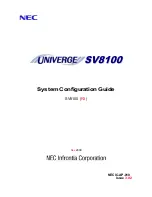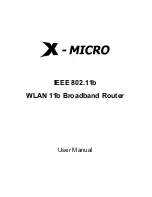
61200990L1-34P
Copyright © 2014 ADTRAN, Inc.
15
1.
INTRODUCTION
The NetVanta 5305 is a modular multiservice access router designed for corporate office connectivity over
Frame Relay or Point-to-Point Protocol (PPP) networks. The NetVanta 5305 has six modular slots for
customizing solutions and runs with the ADTRAN Operating System (AOS).
The NetVanta 5305 family includes the NetVanta 5305 chassis, AC power supply, and system controller.
Currently, the NetVanta 5305 family offers an unchannelized T3/FT3 Wide Module for network and data
applications, the High Speed Serial Interface (HSSI) Wide Module, the Octal T1/E1 Wide Module, and two
integrated auto-sensing 10/100Base-T Ethernet ports for local area network (LAN) connectivity. For virtual
private network (VPN) applications using the NetVanta 5305, the enhanced feature pack provides
encryption/decryption and security acceleration services. Refer to
Installing the NetVanta VPN Accelerator
Card (included in P/N 4200368L3) on page 30
for installation instructions.
Features and Specifications
The NetVanta 5305 has the following features:
•
Unchannelized T3 network access via the T3 Wide Module
•
Integrated IP router with bridging
•
WAN Protocol: Frame Relay, PPP
•
Stateful inspection firewall standard
•
RIP versions 1 and 2, and OSPF routing protocols
•
Two integrated 10/100Base-T Ethernet ports (RJ-48C)
•
Optional VPN accelerator card
•
Network Address Translation: 1:1, 1:many (NAPT), and reverse NAT
•
AOS command line interface (CLI)
•
DHCP client, server, and relay support
•
Front panel LEDs
•
AC, DC, and redundant power supply options
•
3U rack mountable in 19-inch and 23-inch rack
•
Six modular slots
•
RoHS compliant
•
Chassis dimensions: 5.25-inch H x 17-inch W x 11.625-inch D
•
AC power information: 85 to 250 VAC 50/60 Hz
•
Operating temperature: 0°C to 50°C
This hardware installation guide describes the NetVanta 5305 unit, details basic functionality, gives
installation instructions, and lists unit specifications. For more information on a specific application, refer to
the configuration guides provided on the
ADTRAN Support Community
. For details on the command line
interface (CLI), refer to the
AOS Command Reference Guide
. All other related documents are also available
http://supportforums.adtran.com
.















































